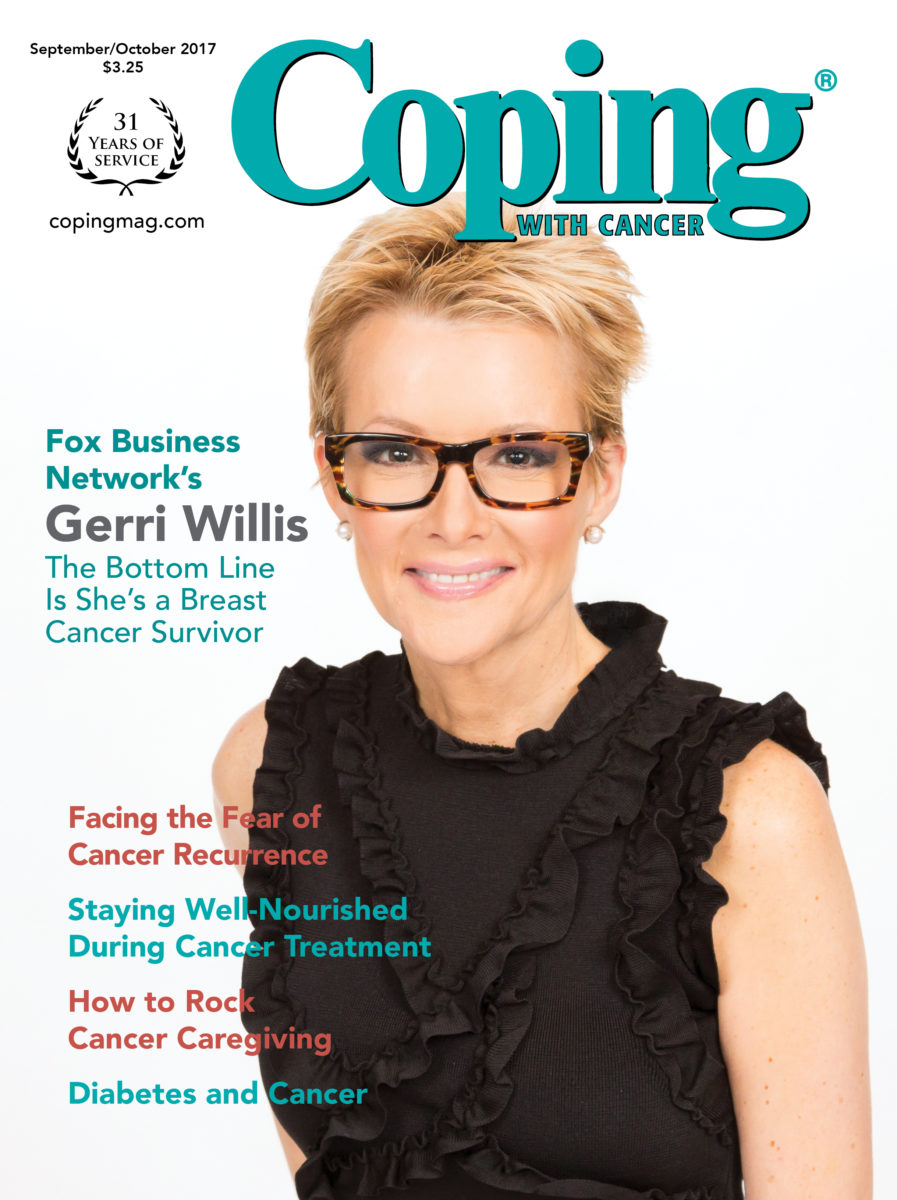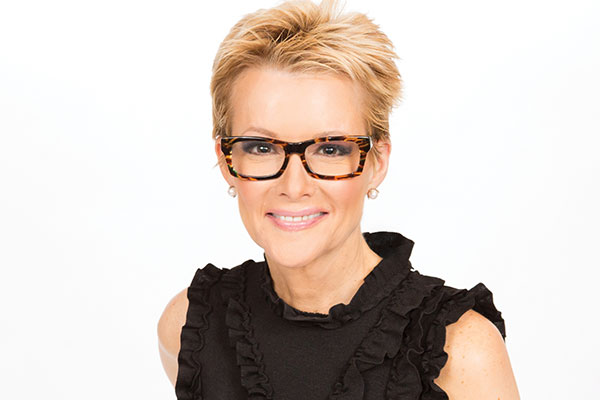Fox Business Network’s Gerri Willis
The Bottom Line Is She’s a Breast Cancer Survivor
by Kaylene Chadwell

“Do you mean I have breast cancer?” Fox Business Network anchor Gerri Willis recalls saying in disbelief during a phone conversation with her primary care physician on April 28, 2016 – the day she was diagnosed with lobular breast cancer. While promoting her most recent book, Rich Is Not a Four-Letter Word, Gerri had felt something abnormal in her right breast and scheduled an appointment with her doctor, who immediately sent her for testing.
“Even though I knew something was not right, even though I had been in for major testing … I still had trouble accepting that diagnosis, and I can’t explain to you why,” Gerri reveals in a recent interview with Coping magazine. “It was difficult for me to embrace and accept, initially. I didn’t have a history of health problems, we didn’t have a lot of breast cancer in my family, so it was something brand-spanking new to me.”
Gerri underwent a mastectomy of her right breast, followed by four months of chemotherapy – Adriamycin, which is better known by cancer survivors as the “Red Devil,” and then paclitaxel. Next came reconstructive surgery last October and, finally, five weeks of daily radiation treatment, which she finished in January. “The most difficult thing was to stop thinking about the treatment as something to endure and start thinking about it as something I would work my way through day by day, hour by hour, and minute by minute,” Gerri admits.
Even though I knew something was not right, even though I had been in for major testing … I still had trouble accepting that diagnosis.
To focus on treatment, Gerri took extended medical leave from FBN, promising her viewers she’d be back. Five months later, on October 10, 2017, she marked her return with an essay on FoxNews.com titled “Six things cancer taught me.” In it she writes, “Through it all, I wasn’t just a patient with a tough diagnosis and long treatment and recovery paths, I was a student. That’s because cancer is an instructor, a teacher imparting life lessons that go far beyond the sick bed.”
Among the lessons Gerri says cancer taught her is this: “Success requires that you have your priorities straight.” And one of the first things to fall from her priority list was her hair. She admits, when she learned chemo would make her hair fall out, that she considered an expensive scalp-freezing treatment to try to save it. “My hair had become a big part of my on-air persona,” Gerri confesses. “Losing my hair seemed like a big deal, but, ultimately, it really wasn’t … I opted not to do that [treatment] because it was expensive and time consuming, and I felt like I needed to be focused on getting better.”
When she first went back on air, Gerri wore a wig styled to resemble her natural hair. But, in April, she decided to toss the wig and reveal her new, short ‘do. “After wearing it [the wig] for a while, it just didn’t feel like me,” she says. “It felt fake and yucky, and my hair was starting to grow back in. About the time my hair was maybe three-quarters of an inch long, I went back on air without the wig because I felt I was being more true to myself.”
Throughout her medical leave, Gerri says, Fox was nothing but supportive. “I had calls from management the whole time,” she explains. “And what they said to me is ‘Are you okay? Do you need anything?’ They were not saying, ‘When are you coming back?’ I had no pressure while I was on medical leave, which really helps you get better because you’re not worried.”
More from Our Conversation with Gerri
How friends and family can help…
Everybody always asks me, “What do you say to someone who has cancer?” And I say, “You say the same thing that you say to everyone else. You talk about a wide range of things. You don’t have to stay focused on the issue at hand.” [As a survivor], you keep on living through treatment, right? It’s not like you shut down anything that’s not about cancer.
On overcoming one of her most difficult obstacles…
On my last [chemotherapy] treatment, my nurses could not get the needle into a vein. It was not collapsed, so they kept poking at me. The more they tried to get that needle in, the more anxiety I felt, and the more my shoulders went up to my ears. And then, suddenly, it occurred to me on about poke number five that, if I would just relax, it would help them get their job done, and help me, ultimately. I thought to myself, this can either be your best day in treatment or your worst. It’s up to you. You have to help. You have to be a part of it. And then I took a big breath, and I relaxed. The next needle went in, found its home, and that was the end of that.
For those fighting cancer right now…
There can be positives to this, and that’s one thing I want to say to people who have been diagnosed with breast cancer and are maybe struggling. I know what it’s like when you first get that diagnosis. You think the worst. You don’t know what to do. But the reality is, it’s never what you think it’s going to be. You may surprise yourself.
Her biggest supporter, however, was her husband. “He helped me immeasurably,” she shares. “He didn’t coddle me. He wasn’t always saying, ‘Oh there, there. Everything’s okay.’ But he was able to lift my spirits with humor, listen to my worries without judgment, and really engage me and distract me when I was focused too much on the chemo, nausea, or pain.”
Since her diagnosis, Gerri says that her outlook has changed 100 percent. “Last year was probably the biggest year of personal growth for me in a long, long time, maybe ever,” she asserts, “because I had a chance to reconsider what was important to me and to really think through my priorities. You just become grateful for everything you have, your family, your friends.”
Though she’s in remission, Gerri still closely watches her health. She’s doing physical therapy and having regular follow-up tests. For the next 10 years, she’ll be on an estrogen- reducing regimen. “I’m also just embracing everything life has to offer,” Gerri shares. “My husband and I are traveling more, seeing more of the world. You don’t know how much time you have, so you have to enjoy it while you can.”

You can keep up with Gerri Willis by following her on Twitter @GerriWillisFBN.
This article was published in Coping® with Cancer magazine, September/October 2017.


